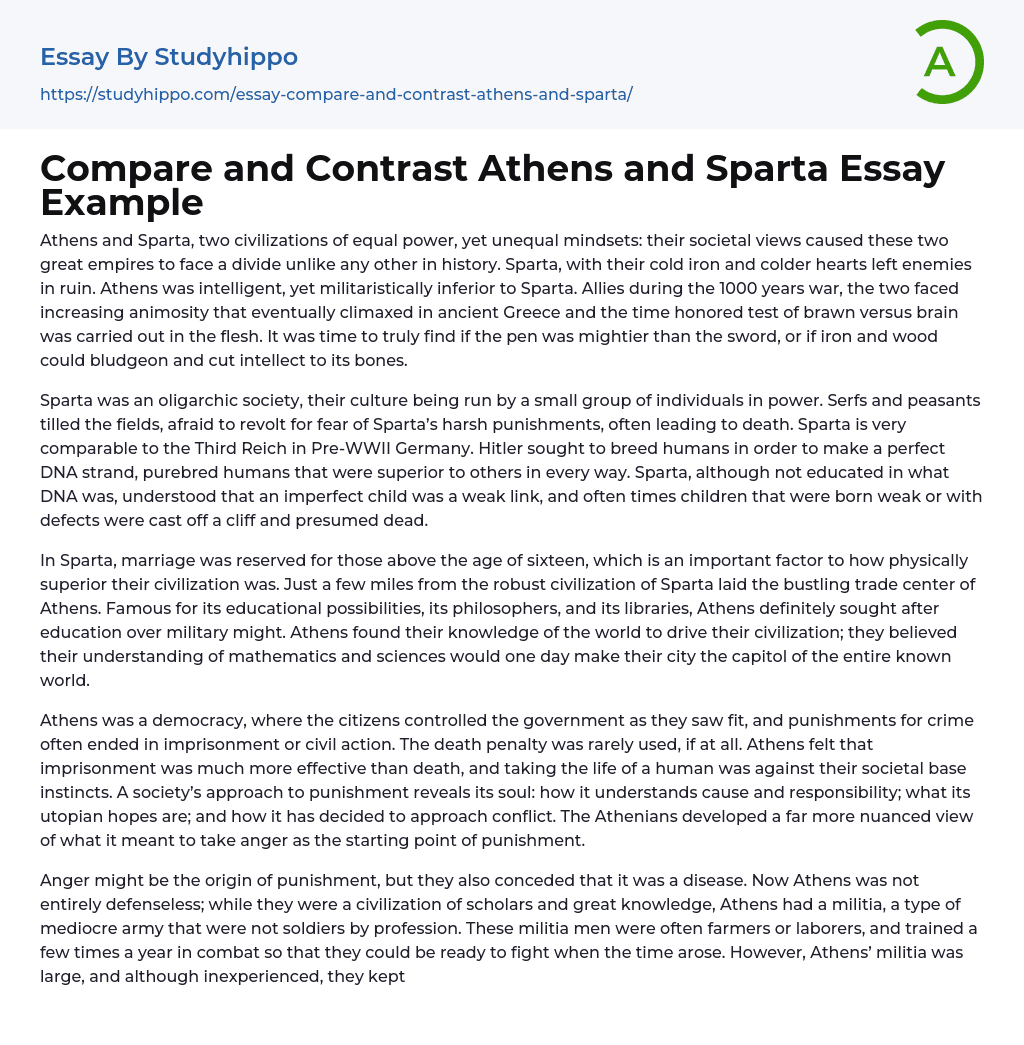Athens and Sparta, two civilizations of equal power, yet unequal mindsets: their societal views caused these two great empires to face a divide unlike any other in history. Sparta, with their cold iron and colder hearts left enemies in ruin. Athens was intelligent, yet militaristically inferior to Sparta. Allies during the 1000 years war, the two faced increasing animosity that eventually climaxed in ancient Greece and the time honored test of brawn versus brain was carried out in the flesh. It was time to truly find if the pen was mightier than the sword, or if iron and wood could bludgeon and cut intellect to its bones.
Sparta was an oligarchic society, their culture being run by a small group of individuals in power. Serfs and peasants tilled the fields, afraid to revolt for fear of
...Sparta’s harsh punishments, often leading to death. Sparta is very comparable to the Third Reich in Pre-WWII Germany. Hitler sought to breed humans in order to make a perfect DNA strand, purebred humans that were superior to others in every way. Sparta, although not educated in what DNA was, understood that an imperfect child was a weak link, and often times children that were born weak or with defects were cast off a cliff and presumed dead.
In Sparta, marriage was reserved for those above the age of sixteen, which is an important factor to how physically superior their civilization was. Just a few miles from the robust civilization of Sparta laid the bustling trade center of Athens. Famous for its educational possibilities, its philosophers, and its libraries, Athens definitely sought after education over militar
might. Athens found their knowledge of the world to drive their civilization; they believed their understanding of mathematics and sciences would one day make their city the capitol of the entire known world.
Athens was a democracy, where the citizens controlled the government as they saw fit, and punishments for crime often ended in imprisonment or civil action. The death penalty was rarely used, if at all. Athens felt that imprisonment was much more effective than death, and taking the life of a human was against their societal base instincts. A society’s approach to punishment reveals its soul: how it understands cause and responsibility; what its utopian hopes are; and how it has decided to approach conflict. The Athenians developed a far more nuanced view of what it meant to take anger as the starting point of punishment.
Anger might be the origin of punishment, but they also conceded that it was a disease. Now Athens was not entirely defenseless; while they were a civilization of scholars and great knowledge, Athens had a militia, a type of mediocre army that were not soldiers by profession. These militia men were often farmers or laborers, and trained a few times a year in combat so that they could be ready to fight when the time arose. However, Athens’ militia was large, and although inexperienced, they kept control using numbers alone rather than organization. On the other hand, Sparta had a military.
A military differs from a militia in one key way – while a militia is comprised of farmers and laborers, a military is a group of armed forces who are professional soldiers, meaning
they do not till fields, they do not work in stables or markets, they are quite simply trained from birth to be killing machines, armed to the teeth with knowledge of warfare, bound with muscle, and remorseless. Sparta’s military was feared among all of Greece for being ruthless and powerful, and even modern movies like 300 display the great military triumphs of such a powerful army.
In Athens, marriage was fairly unregulated. Often times, brides were young, having just entered puberty. Reproducing at such a young age caused many of the children of Athens to have physical or mental defects. In Athens, a physical well-being was not prized as much as a mental well-being, and unlike Sparta, Athenian babies born with defects were kept and raised as though they were “normal”. While this is clearly a much more humanistic standpoint compared to throwing the children off a cliff, it did create an imperfect gene pool that Sparta was trying to avoid.
In effect, these two civilizations butted heads over the course of a few centuries, eventually leading to the weakening and collapse of them both. Yet while both were in power, the known world was in a period of peace, and although tensions were high, such is the way of humanity. Like phoenixes, civilizations fall so that others may rise from their ashes. Athens’ and Sparta’s disputes and eventually downfall was just a part of life, the world keeps spinning, and time, however fought, stops for no man.
- Sergeant essays
- Air Force essays
- Army essays
- Army Values essays
- Soldiers essays
- United States Army essays
- Veteran essays
- Athens essays
- Belgium essays
- Berlin essays
- British essays
- England essays
- Germany essays
- Great britain essays
- Greece essays
- Ireland essays
- Italy essays
- London essays
- Paris essays
- Pompeii essays
- Rome essays
- Russia essays
- Spain essays
- United Kingdom essays
- Alexander The Great essays
- Sparta essays




